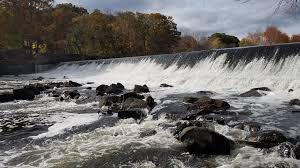Parts of Blackstone River removed from impaired waters list
The Department of Environmental Management has announced that the US Environmental Protection Agency has approved Rhode Island’s recommendations to remove impairments from parts of three waterbodies from USEPA’s List of Impaired Waters under the Clean Water Act. As a result of stringent permitting and long-term investments in pollution abatement infrastructure and practices, segments of Upper Narragansett Bay, Mount Hope Bay, and the Blackstone River impairments now meet water quality standards.
In a release this week, the agency said the announcement helps to underscore the importance of Question 2 – the Beach, Clean Water, Green Bond, which is on the special referendum ballot on Tuesday, March 2. If approved by voters, Question 2 includes an investment of $15 million for drinking water and clean water. According to RI DEM, this would fund much-needed upgrades to drinking and wastewater treatment facilities, combined sewer overflow prevention, and stormwater management.
Segments of the three major Rhode Island waterbodies have demonstrated significant water quality improvements and therefore the impairments have been removed from the 2018-2020 impaired waters list.
DEM’s Office of Water Resources biennially assesses the quality of the state’s surface waters by comparing available monitoring data against the state’s established water quality criteria to determine whether the waters are suitable for such uses as swimming, fish/shellfish consumption, and aquatic life. The results of this assessment are presented in the state’s Integrated Water Quality Monitoring and Assessment Report, which documents the overall quality of the state’s waters.
In the Blackstone River, continuous dissolved oxygen data collected in 2017 and documentation of phosphorus reductions at the WWTF plants and data collected in the river over the last 10-15 years showed a significant drop in phosphorus levels as a result of the WWTF phosphorus reductions, according to RI DEM.
The 2018-2020 list is included in the state’s Impaired Waters Report, available on-line on DEM’s website at: https://dem.ri.gov/programs/benviron/water/quality/pdf/iwr1820.pdf
NBRV offers training classes
NeighborWorks Blackstone River Valley will offer several virtual training sessions for homeowners – and those who hope to become homeowners – in March.
Landlord Training will be offered online on Saturday, March 6 from 9 a.m. to 12:30 p.m. The jam-packed 3.5 hour session costs $79 covers the basics of business management, lease agreements, and rights and responsibilities as a landlord. It is best suited for those who already own or are interested in owning a multifamily property. Register here.
Fast Track to HomeOwnership will also be offered on Saturday, March 6 from 9 a.m. to 1 p.m. The online two-session series costs $99 and runs through the basics of buying and maintaining a home. The class is ideal for families interested in buying a home but are not sure of where to start or if they have the credit and savings ready to sign on the dotted line, as well as families who are pre-approved for a mortgage, already have a “purchase and sales agreement,” or have an expired home buyer education certificate from a previous class. Register here.
Get schwag attending BVTC’s virtual celebration
Register here.
The Department of Environmental Management has announced that more than $150,000 in farm viability grants is available for projects that enhance the competitiveness of specialty crops grown in Rhode Island. The funds are from the US Department of Agriculture’s Specialty Crop Block Grant program. Specialty crops are defined by this federally supported program as fruits and vegetables, dried fruit, tree nuts, and nursery crops including floriculture including Christmas Trees, cut flowers, honey, hops, and turf grass production.
Grant awards may be used for research, promotion, marketing, nutrition, trade enhancement, food safety, food security, plant health, product development, education, “buy local” initiatives, and for programs that provide for increased consumption and innovation, improved efficiency and reduced costs of distribution systems, environmental concerns and conservation, and development of cooperatives.
Funds must still meet the requirements of the specialty crop grant program, but there is an emphasis on projects that provide COVID-19 assistance/ relief.
DEM anticipates that approximately $150,000 – $300,000 will be awarded under this grant round with no direct match required. During the most recent funding cycles, the average amount of funding per project ranged from approximately $32,400 to $42,600. DEM awarded $130,008 in farm viability grants last fall to four Rhode Island-based groups to support local agriculture.
Eligible entities include Rhode Island farmers, residents, or community groups engaged in research, marketing, food safety/security, plant health, buy-local initiatives, and/or development of cooperatives. Funded projects must support the broad competitiveness of locally-grown specialty crops in Rhode Island. Initiatives that benefit a sole commercial product or provide a profit to a single individual or group will not be considered. Since 2016, DEM has awarded over $800,000 in grants through this program to support growth of specialty crops in Rhode Island.
For more information on the Farm Viability program, visit DEM’s website. Applications should be emailed to [email protected] in DEM’s Division of Agriculture by March 31. Grant-related questions should be directed to Ananda Fraser, produce safety program coordinator in DEM’s Division of Agriculture at 222-2781, ext. 72411 or via email to [email protected].








